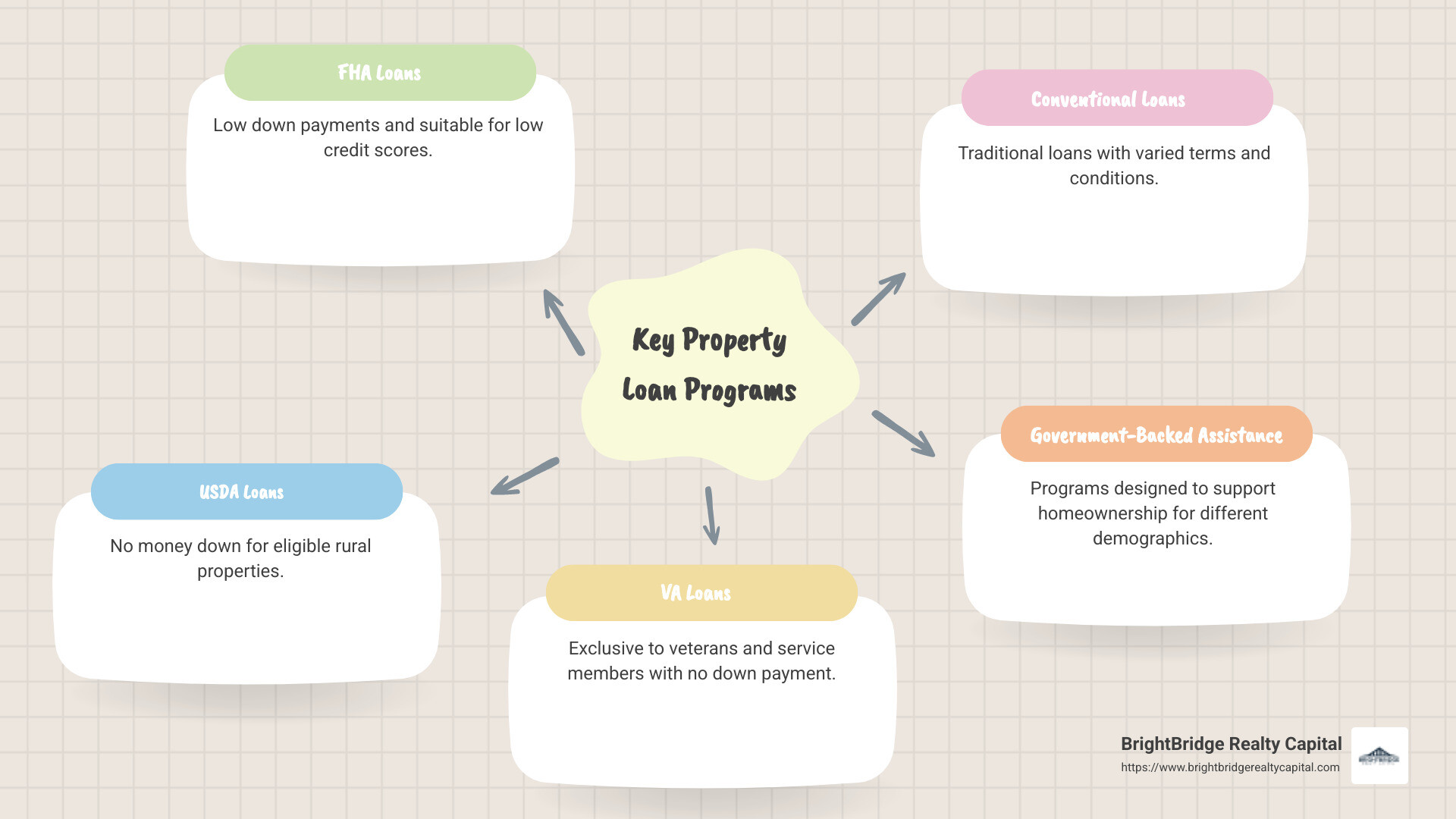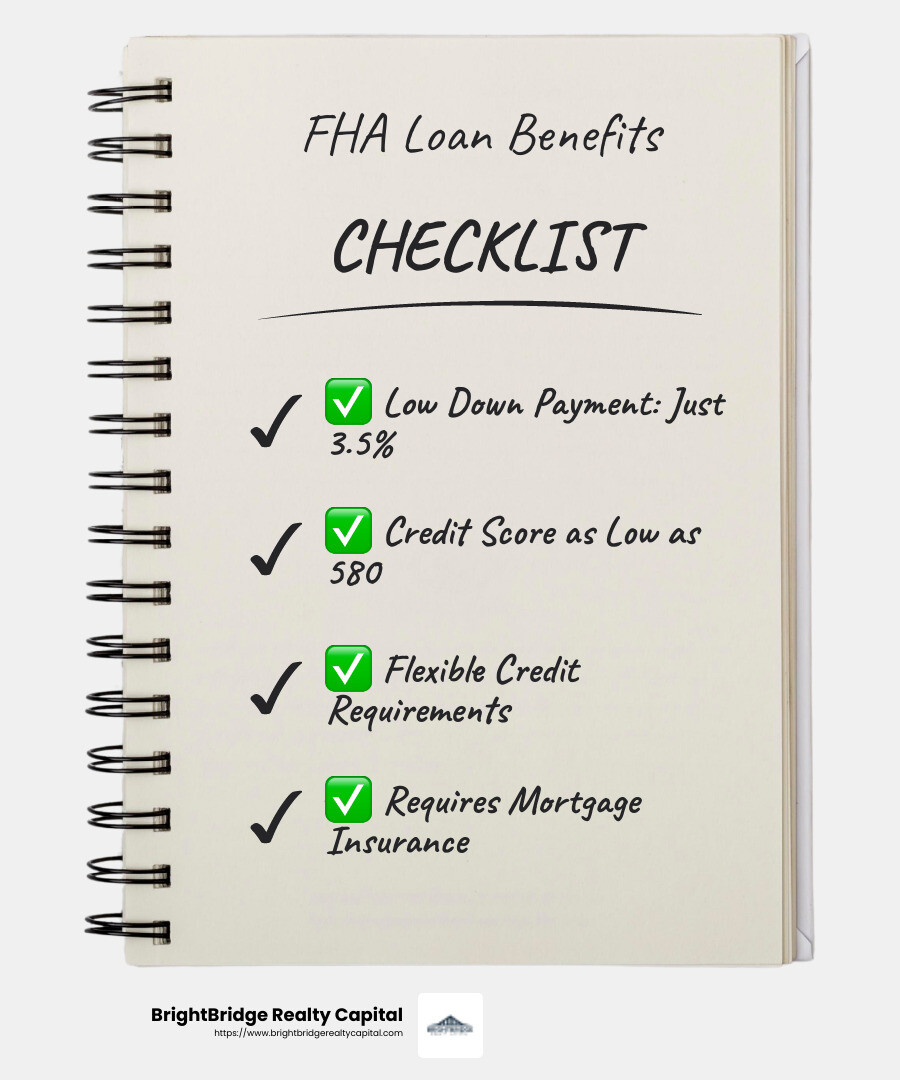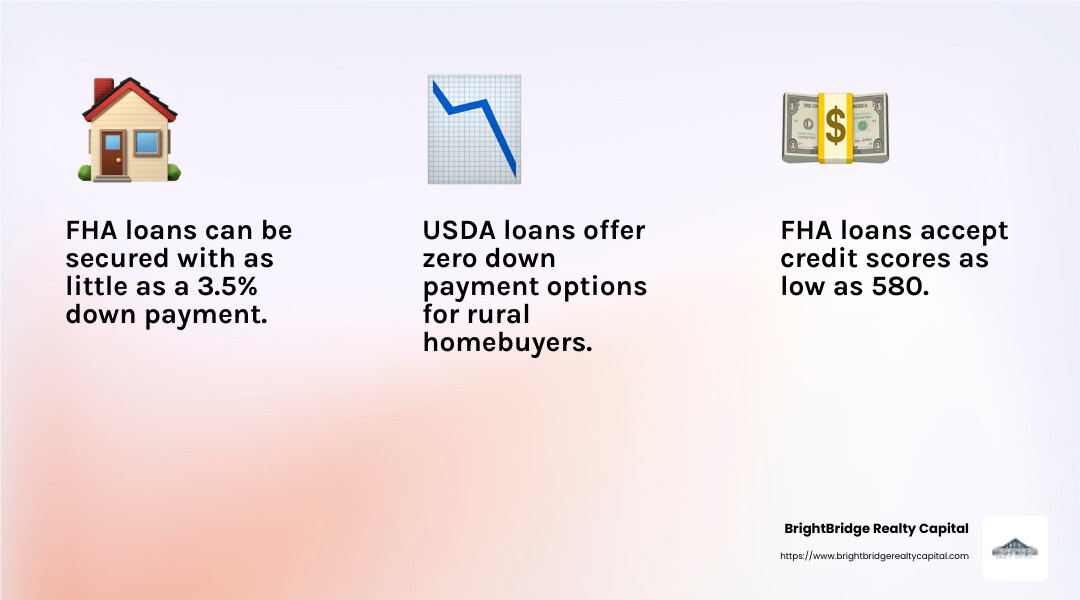Unlocking Opportunities: A Guide to Property Loan Programs

When it comes to property loan programs, there's a wealth of financing options available to homebuyers and real estate investors. Understanding these programs can be a game-changer, especially if you're seeking cost-effective ways to acquire or invest in property. Whether you're a first-time homebuyer or a seasoned investor, navigating through conventional loans and government-backed mortgage assistance can help you achieve your real estate goals.
Key Insights on Property Loan Programs:
- FHA Loans: Lower down payments and credit score requirements make these ideal for first-time buyers.
- USDA Loans: These allow for no money down on properties in certain rural areas.
- VA Loans: Custom for veterans and active service members, offering favorable terms without requiring a down payment.
Taking advantage of these programs can make the path to homeownership or real estate investment more accessible and affordable.
Being informed about your financing options could be the key to open uping the door to your property dreams.

Terms related to property loan programs:
Understanding Property Loan Programs
When diving into property loan programs, it's crucial to understand the different types available. Each has its own set of features, benefits, and requirements. Let's explore some of the most common options, including conventional loans, government-backed mortgage assistance, and FHA loans.
Conventional Loans
Conventional loans are not backed by the government, making them a popular choice for those with strong credit and a steady income. These loans often require a higher credit score, typically starting at 620, and a down payment as low as 3%. However, if you put down less than 20%, you'll likely need to pay for private mortgage insurance (PMI).
Pros:
- Flexibility: Can be used for primary residences or investment properties.
- PMI Removal: You can eliminate PMI once 20% equity is reached.
Cons:
- Stricter Requirements: Higher credit scores and detailed financial documentation are needed.
- PMI Costs: Additional costs if the down payment is below 20%.
Conventional loans are ideal for those with a solid financial background looking for flexibility in their property purchase.
Government-Backed Mortgage Assistance
Government-backed mortgage assistance programs are designed to make homeownership more accessible, particularly for first-time buyers or those with lower income.
FHA Loans are a prime example, managed by the Federal Housing Administration. They offer lower down payments and credit score requirements, making them an attractive option for many. To qualify, you typically need a credit score of at least 580 and a 3.5% down payment. These loans can help you get into a home with less upfront cash.
Pros:
- Lower Barriers: Easier qualification with lower credit score and down payment requirements.
- Accessible: Suitable for first-time homebuyers and those with limited savings.
Cons:
- Mortgage Insurance: Requires both upfront and annual mortgage insurance premiums.
- Loan Limits: Must find homes within FHA-specified limits.
By understanding these loan programs, you can better steer your path to homeownership or real estate investment. Whether you choose a conventional loan for its flexibility or an FHA loan for its accessibility, knowing your options is key to making informed financial decisions.
Types of Government-Backed Home Loans
When it comes to buying a home, government-backed loans provide several options that can make the process easier and more affordable. Let's explore three popular types: FHA loans, USDA loans, and VA loans. Each of these programs offers unique benefits, such as lower down payments or no down payment at all, making homeownership accessible to a wider range of people.
FHA Loans
FHA loans are managed by the Federal Housing Administration and are designed to help first-time homebuyers or those with lower credit scores.
Low Down Payment: You can secure an FHA loan with as little as a 3.5% down payment, which is significantly lower than many conventional loans.
Credit Flexibility: These loans have more lenient credit score requirements, typically accepting scores as low as 580.
Mortgage Insurance: FHA loans require both an upfront and an annual mortgage insurance premium, which adds to the overall cost.

USDA Loans
The USDA loan program is aimed at helping low- to moderate-income individuals or families purchase homes in rural areas.
No Money Down: One of the standout features of USDA loans is the ability to buy a home with zero down payment, making it an attractive option for those with limited savings.
Rural Development: These loans are specifically for homes in designated rural areas, supporting the development and stability of these communities.
Income Limits: Eligibility for USDA loans is based on income, and it must fall within certain limits for your area.

VA Loans
VA loans are available to veterans, active service members, and eligible spouses, offering a path to homeownership with several advantages.
No Down Payment: Most VA loans do not require a down payment, which can significantly lower the upfront cost of buying a home.
No Mortgage Insurance: Unlike other government-backed loans, VA loans do not require private mortgage insurance, reducing monthly expenses.
Competitive Rates: These loans often come with favorable interest rates compared to conventional loans.

By understanding these government-backed home loans, you can find the right fit for your financial situation and homeownership goals. Whether you're a first-time buyer, a resident of a rural area, or a veteran, there's likely a program that can help make your dream of owning a home a reality.
How to Qualify for Property Loan Programs
Qualifying for property loan programs involves meeting specific requirements. These usually focus on your credit score, income, and the property being your primary residence. Let's break it down:
Credit Score Requirements
Your credit score plays a big role in qualifying for property loans. Each loan type has different credit score requirements:
FHA Loans: You might qualify with a credit score as low as 580. This makes it easier for those with less-than-perfect credit to secure a loan.
USDA Loans: Although there's no set minimum credit score, lenders typically look for a score of 640 or higher.
VA Loans: Generally, a credit score of 620 is preferred, but some lenders might accept lower scores depending on other factors.
Income Eligibility
Income is another crucial factor. Different programs have different income requirements:
USDA Loans: These have strict income limits based on your area's median income. Check local guidelines to see if you qualify.
FHA and VA Loans: While there's no strict income limit, you must demonstrate a stable income. This shows lenders you can handle monthly payments.
Primary Residence Requirement
To qualify for most government-backed loan programs, the home you buy must be your primary residence. This means:
- You must live in the home for most of the year.
- Rental properties or vacation homes usually don't qualify for these loans.
Understanding these requirements helps you steer the process of securing a property loan. Whether you're a first-time homebuyer or looking to move to a rural area, knowing these details can help you choose the right loan program for your needs.
Property Loan Programs for First-Time Homebuyers
Buying your first home is a big step, and property loan programs can make it easier. Let's explore how first-time homebuyers can get help through various programs and agencies.
First-Time Homebuyer Assistance
First-time homebuyers have access to special assistance programs. These programs often offer:
- Lower Down Payments: Some programs require as little as 3% down, making it easier to save up for your first home.
- Reduced Interest Rates: You might qualify for lower interest rates, which can save you money over the life of your loan.
- Closing Cost Assistance: Some programs help cover closing costs, reducing upfront expenses.
State Programs
Each state may offer its own state homebuyer assistance programs. These programs can provide:
- Grants: Free money you don't have to pay back, which can be used for down payments or closing costs.
- Low-Interest Loans: Loans with favorable terms to help cover the cost of buying a home.
- Tax Credits: Some states offer tax credits to first-time homebuyers, reducing your tax bill.
To find out what your state offers, contact your local housing finance agency (HFA).
Local Housing Finance Agencies
Local housing finance agencies (HFAs) are a great resource for first-time buyers. They work to make homeownership affordable by offering:
- Educational Workshops: Learn about the homebuying process and how to manage your mortgage.
- Personalized Counseling: Get one-on-one advice about financing options and how to improve your credit score.
- Access to Local Programs: HFAs can connect you with local programs that offer financial assistance.
By tapping into these resources, first-time homebuyers can find the support they need to make homeownership a reality. Whether through state programs or local HFAs, there's help available to guide you on your journey to owning your first home.
Frequently Asked Questions about Property Loan Programs
Navigating property loan programs can be confusing. Here, we answer some common questions to help you understand your options.
What are the 5 types of government home loans?
There are several types of government-backed home loans designed to make homeownership more accessible:
FHA Loans: These loans are managed by the Federal Housing Administration. They are ideal for first-time homebuyers, offering low down payments and accommodating lower credit scores.
USDA Loans: Offered by the U.S. Department of Agriculture, these loans help people in rural areas buy homes with no money down. They are perfect for those looking to live in the countryside.
VA Loans: Available to veterans and active service members, VA loans offer benefits like no down payment and no private mortgage insurance (PMI). They are backed by the U.S. Department of Veterans Affairs.
HUD Loans: The Department of Housing and Urban Development (HUD) offers various programs to help low-income families afford homes. These can include assistance with down payments and closing costs.
Conventional Loans: While not government-backed, conventional loans are a popular choice. They require higher credit scores and larger down payments but can be used for a variety of property types.
How do I apply for a USDA loan?
Applying for a USDA loan involves a few steps:
Check Your Eligibility: USDA loans are available for rural properties, so first ensure the property is in an eligible area. Your income should also meet USDA guidelines.
Find an Approved Lender: You must work with a lender approved by the USDA. They will guide you through the process and help you understand the specific requirements.
Submit Your Application: Provide the necessary documentation, including proof of income, credit score, and other financial details. Your lender will handle the rest.
What are the FHA loan requirements?
FHA loans are known for their flexible requirements, making them a popular choice for many homebuyers:
Credit Score: A minimum credit score of 580 is typically required for an FHA loan with a 3.5% down payment. If your score is lower, you might still qualify with a higher down payment.
FHA-Approved Lender: You need to apply through a lender approved by the FHA. They will assess your financial situation and guide you through the application process.
Property Requirements: The home must meet specific standards set by the FHA, ensuring it's safe and livable.
Understanding these requirements can help you determine if an FHA loan is the right fit for your homebuying journey. By meeting the criteria and working with an approved lender, you can take advantage of this accessible loan program.
Conclusion
Choosing the right property loan program can be a game-changer in your real estate journey. At BrightBridge Realty Capital, we specialize in providing customized real estate financing solutions custom to your needs. Our focus is on delivering quick funding with flexibility and ease, ensuring you can seize opportunities as they arise.
Why Choose BrightBridge Realty Capital?
Fast Closings: We understand timing is crucial in real estate. That's why we pride ourselves on our ability to close deals swiftly, often within a week. This speed sets us apart and allows you to move forward without delays.
Direct Lending: By offering direct lending, we cut out the middleman. This not only streamlines the process but also ensures you receive competitive rates and a seamless experience.
Nationwide Reach: With locations in New York, NY, and a broad national presence, we're equipped to support your real estate investment needs across the country.
Our team is dedicated to helping you open up real estate opportunities with confidence. Whether you're a seasoned investor or a first-time homebuyer, we have the expertise and resources to guide you through the process.
Ready to explore your options? Contact us today to find how we can help you achieve your real estate investment goals.


